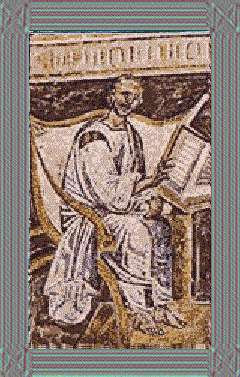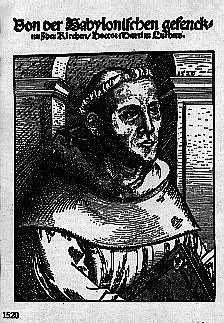|
God's will and our free will
|
I. Why do we pray?
Before we ask how to seek for God's will, we should ask what God's
will is. If God will is absolute, then why do we bother to pray?
The following message posted in the newsgroup alt.religion.christian
reflects the view of God's absolute will.
"Most professing Christians believe that God
is sovereign. but how sovereign? when it comes to prayer the Christian
seems to be more sovereign than Him. "Claim it and you have
it" is the common expression we hear during prayer meetings.
I heard a preacher said that we can change the mind of God when
we pray. I think God's sovereignty is absolute and no matter how
we pray or what we pray, sincere or not, He is not affected at
all. as Steve Green says in his song, it's God and God's alone.
This always stops us from being boastful about "good"
things happening in our life AND keeps us humble and trustful
in "rough" situations."
--Joey Santos,Punlaan Christian Movement
Several Christians regard prayer as a spiritual exercise. The
effect of prayer is our interior renewal rather than changes
in external circumstance.
II. Predestination vs. Free will
The debate between God's absolute plan (predestination) and human's
free will has been dragged for thousands years. Originally the
argument was concerned with whether God granted salvation to certain
people and excluded certain others. Now the topic is extended
to whether EVERYTHING is pre-determined by God.
St. Augustine vs. Pelagius
According to St. Augustine, humans are born with the original
sin, and therefore we are unable to exercise the power of
free will to do good. Although faith seems to be an act of free
will, actually it is a gift of God. On the contrary, Pelagius
denied the sinful nature of humans. Later Charles Finnely claimed
that it is possible for humans to reach the standard of God on
our own will.

This is the oldest surviving portrait of Augustine, from the Lateran in Rome in the sixth century. The frame is added by me, not from the original.
Luther vs. Erasmus
Erasmus contended that salvation is a cooperative enterprise of
God and man, even though man's share in it is so small. Martin
Luther, on the other hand , was opposed to the notion that "good
works," which were emphasized by the Catholic church, can
make a good man. In contrast, salvation is totally a grace
of God in which man can do nothing.

A Treaty of God Works, Martin Luther (1520).
Calvin vs. Bolsec & Arminian
Calvin asserted that since the fall of Adam and Eve, every aspect
of humans are corrupted, including our reason and will. In the
same vein of Augustine and Luther, Calvin stated that humans are
not capable of knowing and choosing God. Instead, the sovereign
God has His absolute plan of salvation. Bolsec, Calvin's opponent,
viewed the relationship between God and man as an interactive
and mutual covenant. Calvin's doctrine is named as classical
predestination while Bolsec's view is entitled covenantal school.
Later Calvin's ideas was summarized as "Five Points,"
in reply to the challenges of Arminians.
By carefully examining two sides of views, Holtrop (1993) asserted
that Calvinist classical predestination implies Aristotelian view
of remote and proximate causality--as well as a sharp line between
eternity and history. While this classical views begin with a
picture of God as immutable, the covenantal alternative sees Him
as more personal in the way he interacts with people in history,
Philip said it is less Greek and more Biblical.
Recent development
For several hundred years, predestination has been the majority
while free will remained the minority. In this century, more
and more theologians suggested another theory of God's will: God
is no longer to be understood as an immutable monarch controlling
human history and individual lives, but rather is to be seen as
a self-limiting, loving, and suffering father who allows himself
to be affected by his creatures (e.g. Hans. Kung, T. Chardin,
John Cobb, David Griffin, Clark Pinnock).
The dilemma about predestination and free will is no longer just
a religious question. Scientists also involve into the debate
of determinism. For example, Quantum mechanics implies that
the reality is composed of many possibilities, but Einstein didn't
like quantum mechanics because he said "God doesn't play a
dice with the universe."
III. Applications
No single best
God did not program us in everything and prepare us just one best
thing. In this sense, there is no single best school, best career
or best mate. There are always pros and cons in every choice.
Perhaps the issue is not which is the right university prepared
by God, but what is the right attitude towards study. By the
same token, the question is not who is the right person to marry,
but what is the right attitude towards love and marriage.
Yet there is a boundary
The above notion does not imply that we can do anything as we
like. There is still a boundary. We know that it is definitely
not the will of God for us to steal or to murder. Before we inquire
whether something is God's will, use our head!
Act as an grown-up
The emphasis of the preparation of God may reinforce our laziness
and cowardice. During the reign of Nazi in World war II, several
German pastors such as Paul Tillich and D. Bonhoeffer were disappointed
at the silent gesture of Germany churches. Bonhoeffer said "the
world has come of age" (grown-up) and it was humans' responsibility
to fight against the ungodly regime. He participated in an underground
movement against Hitler, and at last was arrested and executed.
God's will is actualized through humans!
The following story printed in Reader's Digest is a good
illustration: Once a flood occurred in Peter's home town. A driver
drove by and offered Peter a ride to get to a safe place. Peter
refused and said, "I am waiting for God's rescue."
Later the water level went up and thus Peter stayed in the balcony.
A boat went by and people in the boat asked Peter to leave with
them. Peter gave them the same answer. When the house was almost
totally submerged into the water, Peter climbed up to the roof.
A helicopter came and attempted to take Peter away, but Peter
still wanted to wait for God's plan. At last Peter was killed.
In Heaven Peter questioned God, "I have faith in you. Why
didn't you save me?" God said, "I have sent one car,
one boat, and one helicopter to help you!"
References
Baillie, J., McNeill, & Van Dusen, H. P. (Eds.) (1969). Luther
and Erasmus: Free will and salvation. Philadelphia: Westminster
Press.
Holtrop, P. C. (1993). The Bolsec controversy on predestination,
from 1551 to 1555: the statements of Jerome Bolsec, and the responses
of John Calvin, Theodore Beza, and other Reformed theologians.
Lewiston, NY : E. Mellen.
Recommended further reading
Bonhoeffer, D. (1967). Letters and papers from prison.
New York: Macmillan.
|